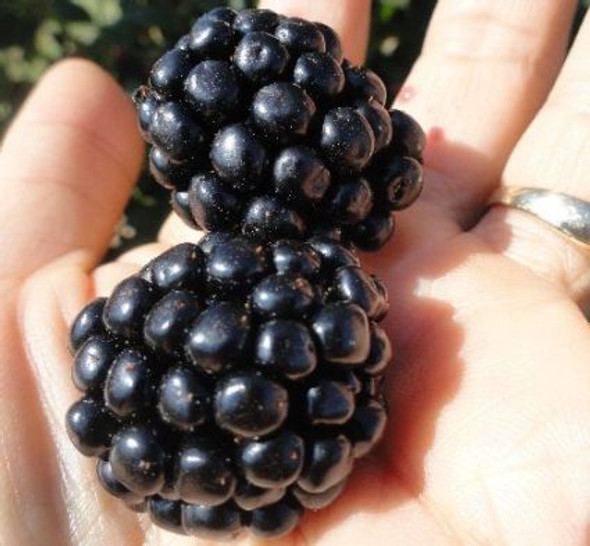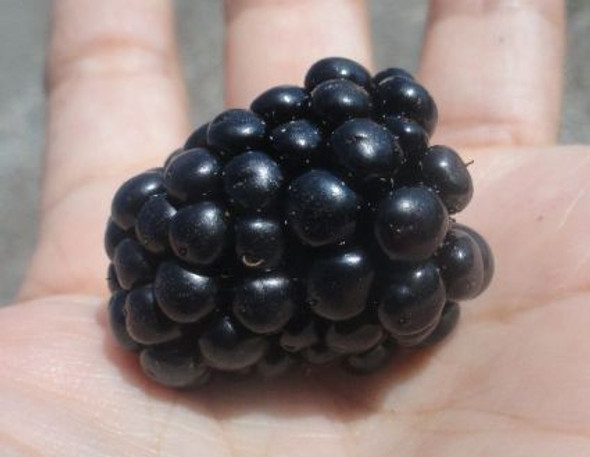Description
‘Galaxy’, tested as ORUS 2711-1, was selected in Corvallis, OR, in 2003 from a cross made in 2000 of ORUS 1393-2-1 (‘Illini Hardy’ × ‘Chester Thornless’) and ‘Triple Crown( as male parent )’. The pedigree of ‘Galaxy’ is the same as ‘Eclipse’, but the cross was made 1 year earlier.. Firm, medium-large fruit that have excellent fruit quality ripen early in the semierect blackberry season, and have excellent flavor that distinguishes ‘Galaxy’ from most other semierect cultivars.
‘Galaxy’ is a thornless, semierect blackberry that produces large yields of very firm and excellent-flavored fruit that should be well suited to fresh market production in the early season for a semierect blackberry. ‘Galaxy’ is higher yielding and has larger, better flavored, and/or firmer fruit than current cultivars ripening in this season. Although ‘Galaxy’ is expected to be adapted to areas where other semierect blackberries (e.g., ‘Chester Thornless’, ‘Triple Crown’) can be grown successfully, it should be tested on a moderate scale in colder regions before being widely planted.
All the cultivars showed excellent winter cold tolerance wherever they were trialed in the Pacific Northwest. Although ‘Galaxy’s overall adaptation has not been well tested, it has proved to be winter hardy in Arkansas, North Carolina, and British Columbia in typical winters (J.R. Clark, G. Fernandez, C. Lewis, D. Mutz, personal communication), but not in Massachusetts (P. Rizzo, personal communication).
Description and Performance‘Galaxy’ was moderate yielding, with yields greater than those for ‘Navaho’ in most years. In unreplicated trials in 2002–15, ‘Galaxy’ yields were comparable to ‘Eclipse’ in most years (data not shown). There were statistically significant differences between cultivar fruit-weight means, but no significant year or cultivar × year interaction effects. ‘Galaxy’ fruit were consistently about 50% heavier than ‘Navaho’ fruit). ‘Galaxy’ fruit were more attractive and uniform than those of ‘Navaho’, ‘Ouachita’, and ‘Triple Crown’, resulting part from greater drupelet fertility. In the field, ‘Galaxy’ fruit were rated firmer than ‘Triple Crown’, softer than ‘Eclipse’, and similar to the other cultivars in the trial. The fruit’s skin toughness for the cultivars in the trial was similar except for ‘Triple Crown’, which had a very tender skin. Although there were statistical differences in fruit color for the genotypes in the trial, they were not meaningful because all the genotypes had excellent dark colors. ‘Galaxy’ fruit were comparable to the other genotypes in the trial for fruit glossiness. When chewed, ‘Galaxy’ and ‘Eclipse’ fruit were perceived to be much less “crunchy” or “seedy” than those of ‘Navaho’ and ‘Ouachita’ . ‘Galaxy’ fruit flavor was rated better than that of ‘Chester Thornless’ and ‘Ouachita’, and comparable to the other genotypes evaluated. ‘Galaxy’, ‘Eclipse’, ‘Navaho’, and ‘Triple Crown’ had tolerable levels of heat/ultraviolet damage, and less than for ‘Ouachita’ and ‘Chester Thornless’ . Although this could be the result of genotypic differences, we suspect that it was a result, in part, of ‘Galaxy’s earlier ripening season and thus fewer incidents of high temperature. In California’s Central Valley, ‘Galaxy’ fruit held up to sun and heat (up to 43 °C) with minimal fruit damage and was still liked by customers (J. Willems, personal communication).COMPARISON WITH PARENTAL AND COMMERCIAL CULTIVARS
‘Galaxy’ differs from the female parent blackberry plant ‘ORUS 1393-1’ (unpatented) in that ‘Galaxy’ is thornless and the fruit has a sweet, pleasant flavor and are more uniformly shaped, while ‘ORUS 1393-1’ has thorny canes and the fruit are slightly bitter and the drupelets are unevenly set.
‘Galaxy’ differs from the male parent blackberry plant ‘Triple Crown’ (unpatented) in that it is earlier ripening (50% ripe fruit on 5 August) with medium-sized (6.52 g) fruit that is firm with a tough skin, while ‘Triple Crown’ (unpatented) is mid-season ripening (16 August) with large (7.50 g) fruit that is soft with tender skin.
‘Galaxy’ is earlier ripening than other commercial semi-erect blackberries such as ‘Triple Crown’ (unpatented), ‘Navaho’ (U.S. Plant Pat. No. 6,679), or ‘Chester Thornless’ (unpatented). ‘Galaxy’ ripens 4-5 d later than the semi-erect blackberry ‘Loch Ness’ (U.S. Plant Pat. No. 6,782) but is more vigorous growing and has firmer fruit with better flavor. ‘Galaxy’ is not typically as high-yielding as ‘Chester Thornless’ (unpatented) or ‘Triple Crown’ (unpatented). The fruit of ‘Galaxy’ are firm and have tough skin like those of ‘Chester Thornless’ (unpatented) and are firmer and much tougher skinned than ‘Triple Crown’ (unpatented) fruit. ‘Galaxy’ fruit are sweeter than those of ‘Chester Thornless’ (unpatented) but not as sweet as those of ‘Navaho’ (U.S. Plant Pat. No. 6,679) or ‘Triple Crown’ (unpatented).
‘Galaxy’ is primarily suited to fresh market sales, although it can be machine-harvested for the processed fruit market. ‘Galaxy’ fruit has been stored for 14 days in a plastic clamshell at 0 C with no mold and while retaining its firmness and skin resistance to abrasion./Authors: Chad E. Finn 1 , Bernadine C. Strik 2 , Brian M. Yorgey 3 , Mary E. Peterson 4 , Patrick A. Jones 5 , Gil Buller 5 , Jungmin Lee 6 , Nahla V. Bassil 7 , and Robert R. Martin 8/
Zone: 5-9
Size: 12cm, 1 year old tissue cultured plant
1 Review
-
Galaxy
I received a beautiful, healthy and vigorous Galaxy baby. No damage, pests or disease. This is consistently a great place to obtain healthy plants. Thank you.










